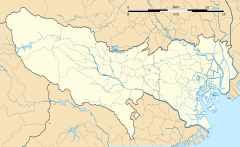Shimo-kitazawa Station
  Shimo-kitazawa Station 下北沢駅 | |||||||||||||||||||||||||||||||||||||||||||||||||
|---|---|---|---|---|---|---|---|---|---|---|---|---|---|---|---|---|---|---|---|---|---|---|---|---|---|---|---|---|---|---|---|---|---|---|---|---|---|---|---|---|---|---|---|---|---|---|---|---|---|
 Shimo-kitazawa Station in May 2019 | |||||||||||||||||||||||||||||||||||||||||||||||||
| Location | Setagaya, Tokyo Japan | ||||||||||||||||||||||||||||||||||||||||||||||||
| Operated by | |||||||||||||||||||||||||||||||||||||||||||||||||
| Line(s) |
| ||||||||||||||||||||||||||||||||||||||||||||||||
| Other information | |||||||||||||||||||||||||||||||||||||||||||||||||
| Station code | OH07, IN05 | ||||||||||||||||||||||||||||||||||||||||||||||||
| History | |||||||||||||||||||||||||||||||||||||||||||||||||
| Opened | 1 April 1927 | ||||||||||||||||||||||||||||||||||||||||||||||||
| Services | |||||||||||||||||||||||||||||||||||||||||||||||||
| |||||||||||||||||||||||||||||||||||||||||||||||||
| Location | |||||||||||||||||||||||||||||||||||||||||||||||||
 Shimo-kitazawa Station Location within Tokyo | |||||||||||||||||||||||||||||||||||||||||||||||||
Shimo-kitazawa Station (下北沢駅, Shimo-kitazawa-eki) is an interchange station on the Odakyu Odawara and the Keio Inokashira lines located in Setagaya, Tokyo, and jointly operated by the private railway operators Odakyu Electric Railway and Keio Corporation.
The station gives its name to the surrounding Shimokitazawa neighborhood which is a popular area for young people in large numbers. It includes small independently owned shops, cafes, live music venues and theaters.
Lines[]
Shimo-kitazawa Station is served by the Odakyu Odawara Line from Shinjuku in Tokyo, and also by the 12.7 km Keio Inokashira Line from Shibuya in Tokyo to Kichijōji. Located between Ikenoue and Shindaita, it is 3.0 km from the Shibuya terminus of the Inokashira Line.[1]
Service pattern[]
On the Keio Inokashira Line, both all-stations "Local" services and limited-stop "Express" services stop at this station. On the Odakyu Odawara Line, only Limited Express services pass the station.
Station layout[]

The Odakyu Odawara and Keio Inokashira lines cross at this station, with the Keio line on elevated tracks above the Odakyu line. After a major station reconstruction project, the Odakyu lines were relocated in March 2013 from their prior surface position to new platforms three stories underground. Additional construction work, ending in 2018, separated the express line trains from the local line trains, one level above. Now, the four-track route that formerly ended at Umegaoka is complete as far as Yoyogi-Uehara station.
An unusual feature of Shimo-kitazawa Station for many years was the use of a single ticket gate serving two independent lines and ticketing systems; this was a legacy of the Inokashira Line's former ownership by Odakyu. Additionally, there were no ticket gates between the two lines. However, as part of a major Station renovation construction project, this was changed in March 2019. Now, both lines have separate entrances and ticket gates, and it is necessary to exit and enter ticket gates in order to switch between lines.
Odakyu platforms[]
The Odakyu station consists of two underground island platforms located on the first and second basement level, serving two tracks each. The platform at B1F serves local and semi express trains, with the platform on B2F serving only express services.
| 1 | ■ Odakyu Odawara Line | for Machida, Hon-Atsugi, Odawara, (Hakone-Tozan Railway) Hakone-Yumoto, (Odakyu Tama Line) Karakida, (Odakyu Enoshima Line) Fujisawa, Katase-Enoshima |
| 2 | ■ Odakyu Odawara Line | for Shinjuku |
Express, Commuter Express and Rapid Express.
| 3 | ■ Odakyu Odawara Line | for Machida, Hon-Atsugi, Odawara, (Hakone-Tozan Railway) Hakone-Yumoto, (Odakyu Tama Line) Karakida, (Odakyu Enoshima Line) Fujisawa, Katase-Enoshima |
| 4 | ■ Odakyu Odawara Line | for Shinjuku Joban Line for Abiko and Toride |
Local, Semi Express, Express and Commuter Semi Express.
Keio platforms[]
The Keio station consists of an elevated island platform serving two tracks.[2]
| 1 | ■ Keio Inokashira Line | for Meidaimae, Eifukuchō, and Kichijōji |
| 2 | ■ Keio Inokashira Line | for Shibuya |
History[]
The Odakyu section was opened on April 1, 1927, and the Keio section on August 1, 1933.[1]
From 22 February 2013, station numbering was introduced on Keio lines, with Shimo-kitazawa Station becoming "IN05".[3]
From 23 March 2013, trains used the new underground platforms located on the third basement (B3F) level, and the original ground-level platforms were taken out of service. As of 3 March 2018, platforms on the second basement (B2F) level have opened for use by all-stations services, with the lower platforms used by limited-stop services only.[4]
Passenger statistics[]
In fiscal 2011, the Keio station was used by an average of 127,124 passengers daily.[5] The passenger figures for previous years are as shown below.
| Fiscal year | Daily average |
|---|---|
| 1999 | 132,343[1] |
| 2010 | 128,860[5] |
| 2011 | 127,124[5] |
Surrounding area[]

- Setagaya Ward Office
See also[]
References[]
- ^ Jump up to: a b c Terada, Hirokazu (July 2002). データブック日本の私鉄 [Databook: Japan's Private Railways]. Japan: Neko Publishing. p. 205. ISBN 4-87366-874-3.
- ^ Kawashima, Ryozo (April 2010). 日本の鉄道 中部ライン 全線・全駅・全配線 第1巻 東京駅―三鷹エリア [Railways of Japan - Chubu Line - Lines/Stations/Track plans - Vol 1 Tokyo Station - Mitaka Area]. Japan: Kodansha. pp. 10, 53. ISBN 978-4-06-270061-0.
- ^ 京王線・井の頭線全駅で「駅ナンバリング」を導入します。 [Station numbering to be introduced on Keio Line and Inokashira Line] (PDF). News release (in Japanese). Keio Corporation. 18 January 2013. Retrieved 23 February 2013.
- ^ 小田急線の複々線化完了、下北沢駅で開通式 [Odakyu Line Multiple Line Conversion Complete, Opening Ceremony at Shimokitazawa Station]. Sankei Shinbun Online (in Japanese). Japan: Sankei Shinbun. 3 March 2018. Retrieved 5 March 2018.
- ^ Jump up to: a b c 1日の駅別乗降人員 [Average daily station usage figures] (in Japanese). Japan: Keio Corporation. 2013. Retrieved 23 February 2013.
External links[]
| Wikimedia Commons has media related to Shimo-Kitazawa Station. |
- Shimo-kitazawa Station information (Keio) (in Japanese)
- Shimo-kitazawa Station information (Odakyu) (in Japanese)
Coordinates: 35°39′41″N 139°40′3″E / 35.66139°N 139.66750°E
- Stations of Odakyu Electric Railway
- Keio Inokashira Line
- Stations of Keio Corporation
- Railway stations in Japan opened in 1927
- Odakyu Odawara Line
- Railway stations in Tokyo

